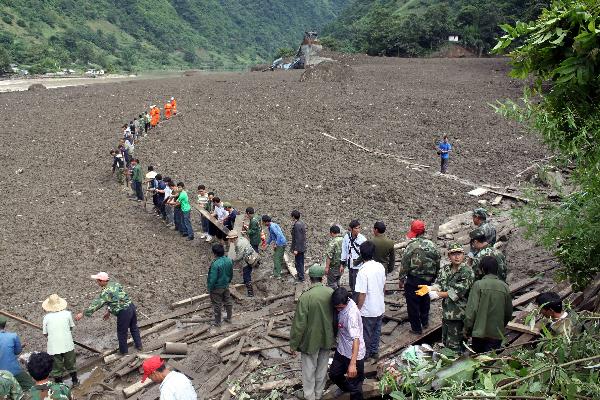Natural disasters likely to continue
Recalling the nightmare early on Wednesday, Yang Guihua did not want to believe it was true.
The mudslide destroyed the 34-year-old's house in Migu village, Puladi township of Gongshan Derung-Nu autonomous county in Southwest China's Yunnan province, leaving her 9-year-old son missing.
 |
|
Rescuers and residents carry out the rescue work in mudslides-hit Puladi Township of Gongshan Drung-Nu Autonomous County, southwest China's Yunnan Province, Aug. 18, 2010. Rain-triggered mudslides occurred here on early Wednesday, causing at least 67 people missing. |
"The downpour, coupled with howling wind, was terrifying. My daughter, son and I did not dare to sleep. But the mudslide took away my son anyway," she said with a trembling voice.
At least 67 people are missing and 38 were injured, 10 severely, after mudslides hit the remote town in northwestern Yunnan early Wednesday.
Most of the missing people are either employees of the Yujin Iron Mine or villagers in the Puladi township, where the mudslides struck at about 1:30 am.
Rescuers have been sent to the township in the wake of the mudslides induced by five months of rain, said county magistrate Li Kunzhen.
Nearly 97 percent of the 5,800 residents in the township bordering Myanmar are ethnic Lisu people.
A working team led by Sun Shaocheng, vice minister of civil affairs, has arrived in Yunnan to oversee the rescue and relief work, the Ministry of Civil Affairs announced late Wednesday.
The team comprised officials from the ministries of civil affairs, finance, land and resources, transport and water resources.
More than 200 local residents have been transferred to safe areas, said a statement from the ministry.
The provincial government has sent tents, quilts, overcoats and clothes to the area, the statement said.
Heavy rain on Tuesday night and Wednesday morning also caused three mudslides in Yinxing township, Wenchuan county in neighboring Sichuan province.
A total of 989 people were evacuated to the local primary school and township government compound. No casualties were reported, said Ren Lu, an information official in Wenchuan.
The downpour in nearby Yingxiu town on Tuesday night and Wednesday morning forced more than 1,000 medical workers, journalists, soldiers and local residents to be evacuated from prefab housing and tents to a tunnel in the Dujiangyan-Yingxiu expressway, Ren told China Daily.
The rain has hampered the clearing of mudslides on the Laohuzui-Yingxiu section of national highway 213, which links Wenchuan with Chengdu, she said.
Torrential rains have wreaked havoc across China this summer, incurring the worst flooding and landslides in decades.
A massive mudslide on Aug 8 in Zhouqu county, in Northwest China's Gansu province, left 1,287 people dead and 457 missing until 4 pm Wednesday afternoon.
According to a meeting focusing on geological hazards sponsored by the Sichuan provincial government on Tuesday evening, all the mudslides in Sichuan since last Thursday were related to the Wenchuan earthquake on May 12, 2008.
Meeting participants said the quake zone would witness a high incidence of geological hazards three to five years after the magnitude-8.0 Wenchuan earthquake, which killed nearly 90,000.
Geologist Xu Qiang from the Chengdu University of Technology said that of all the hazards, mudslides would be the most dangerous threat to the quake zone.
The quake has caused the fragmentation of massifs, which are large blocks of the earth's crust that are isolated by boundary faults and have shifted as units. Due to excessive rainfall this year, they will fall and cause mudslides, he said.
Hazards brought about by the earthquake could last more than a decade, according to Qiao Jianping, a researcher with the Institute of Mountain Hazards and Environment (IMHE) under the Chinese Academy of Sciences.
Mudslides pose threats to 140 cities and towns in the country, one-quarter of which are in Sichuan, said Wei Fangqiang, IMHE deputy chief.
 0
0 







Go to Forum >>0 Comments